Key takeaways:
- Climate action is urgent and personal stories from workshops highlight its emotional impact on communities.
- Workshops foster empowerment and collaboration, leading to practical actions like neighborhood clean-up initiatives.
- Engaging participants through interactive activities and relatable topics enhances learning and fosters a sense of community.
- Flexibility in workshop planning allows for deeper connections and more impactful discussions among participants.
Understanding climate action’s importance
The importance of climate action cannot be overstated. I remember attending a community workshop where participants shared their personal experiences with extreme weather events. Hearing stories of families displaced by floods brought the urgency of this issue to life for me. How can we ignore the impact of our actions when so many lives are affected?
Every small step we take toward sustainability has a rippling effect on the planet. During one workshop, a participant proudly shared how shifting to a plant-based diet not only improved their health but also reduced their carbon footprint. It made me realize that our choices matter, and that each of us has the power to foster change in our communities.
It’s essential to understand that climate action is about more than just policies or regulations; it touches on the well-being of future generations. When I see young children at these events, eager to learn about the environment, it fills me with hope. What kind of world do we want to leave for them? This question drives me to engage more deeply in the conversation about climate action.
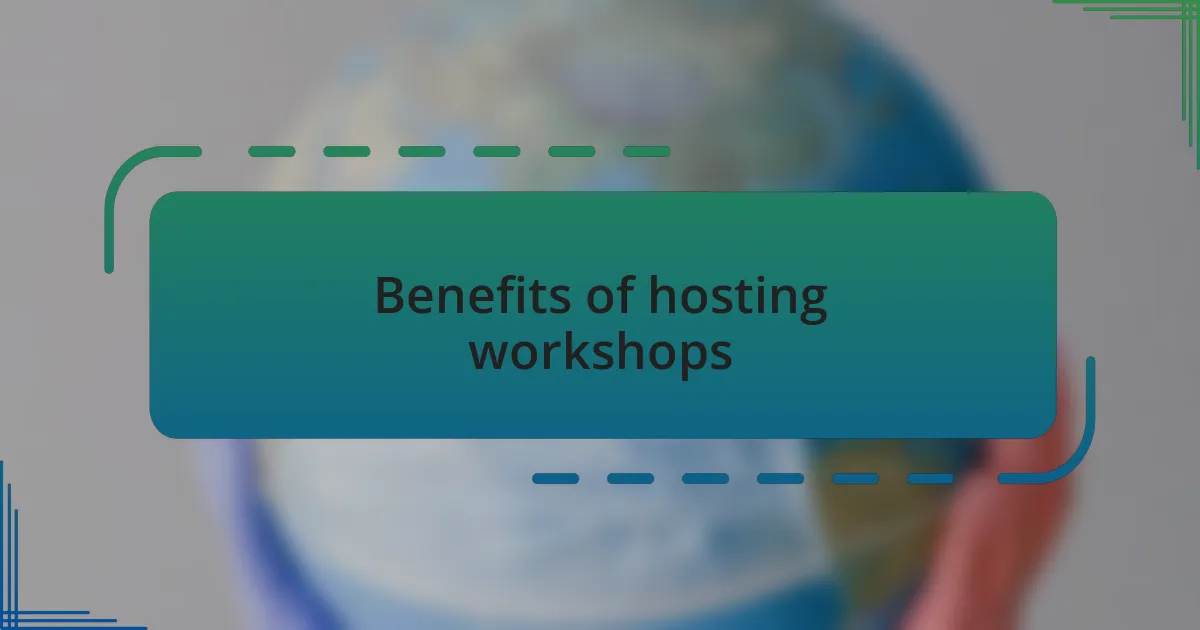
Benefits of hosting workshops
Hosting workshops opens up a vibrant platform for community engagement. I recall a local event where we gathered around to brainstorm actionable ideas for reducing plastic waste in our town. The energy in the room was palpable; everyone felt empowered to contribute, and it was a joyous reminder that when we come together, our collective voice becomes a powerful agent for change.
Another significant benefit is the deepening of knowledge. I’ve witnessed firsthand how individuals left workshops not only more informed but also inspired to take personal action. For instance, during a session on renewable energy, someone shared how they installed solar panels on their home after learning about available incentives. It was a tangible example of how the right information can ignite real-world decisions, transforming theoretical discussions into practical applications.
Workshops also foster a sense of community and solidarity. I often find that participants form connections that extend beyond the event itself. After one workshop, several attendees teamed up to create a neighborhood clean-up initiative. How incredible is it to think that a simple gathering can spark ongoing collaboration among like-minded individuals? That’s the beauty of hosting workshops—they create an ecosystem of support where ideas flourish and action follows.
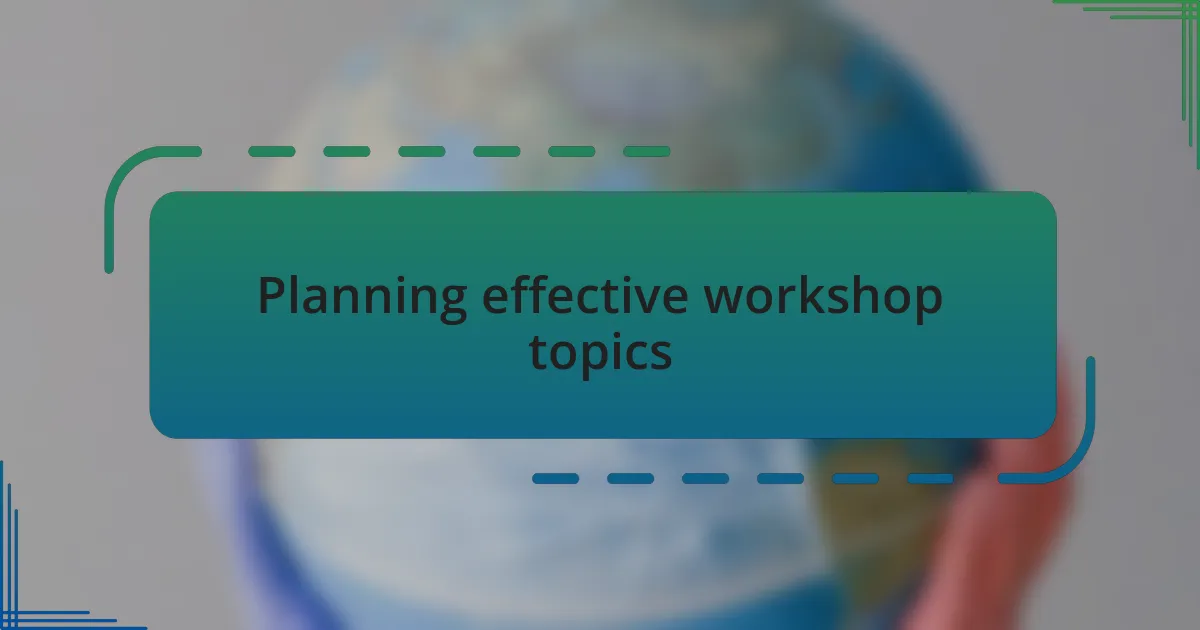
Planning effective workshop topics
Planning effective workshop topics requires a blend of relevance and inspiration. I remember sifting through various themes before our last event and realizing that participants are most engaged when the topics resonate with their immediate concerns. We settled on “Sustainable Living on a Budget,” and the room buzzed with attendees sharing their challenges and solutions. It made me consider: how often do we overlook the power of relatability in our planning?
I also learned the importance of balancing educational content with hands-on activities. During a workshop about composting, we started with a brief presentation but quickly transitioned into a demonstration. Seeing participants roll up their sleeves, actively mixing compost ingredients, was unforgettable. It struck me that people retain information better when they are physically engaged. Have you ever noticed how much more memorable a workshop becomes when you’re actively involved?
Finally, feedback plays a crucial role in shaping future topics. I always solicit input after each session, and I’ve found that participants appreciate when their voices are heard. One attendee suggested a follow-up on urban gardening, which we later hosted. The excitement that generated demonstrated how effectively aligning future topics with audience interests strengthens community bonds and individual commitment—don’t you think that’s a powerful motivator for planning?
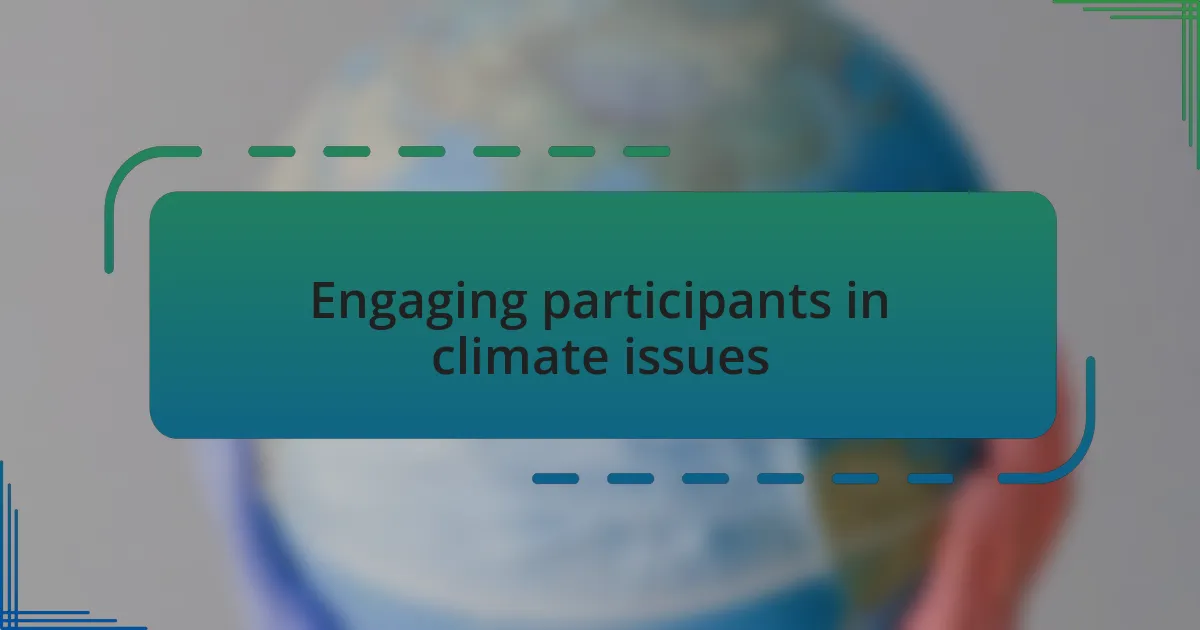
Engaging participants in climate issues
Engaging participants in climate issues is all about creating a connection. I remember hosting a session where, instead of starting with dry statistics, I shared a personal story about my own journey toward reducing plastic waste. The moment I opened up about my struggles to cut back on single-use items, I could see a shift in the room. Attendees started sharing their own experiences, and it felt as if we were all in this together, united by common challenges.
In another workshop, I introduced interactive group discussions to stimulate dialogue on local climate impacts. Each table tackled a different aspect of our community’s environmental challenges, and I was amazed at the passionate conversations that erupted. Participants felt a sense of ownership and responsibility for solutions, which I believe is vital in fostering long-term engagement. Asking them pointed questions like, “What change can you implement this week?” transformed the session from passive learning into a call to action.
Lastly, I found that incorporating local success stories can ignite enthusiasm. During a session, I showcased a neighboring town’s successful tree-planting initiative, which led to a lively brainstorming session about how our own community could undertake similar actions. Everyone loves an inspiring example they can relate to. It made me realize just how important it is to highlight achievable goals; after all, when people see what others have accomplished, it encourages them to believe they can contribute, too.
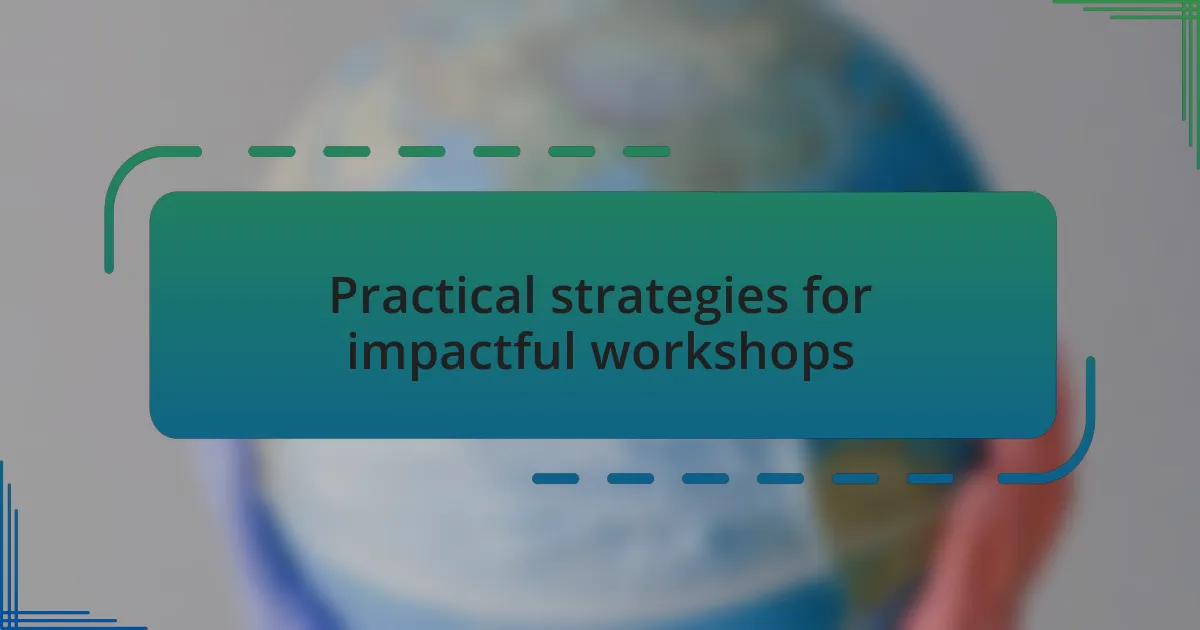
Practical strategies for impactful workshops
One of the most effective strategies I discovered was to incorporate hands-on activities into the workshops. For instance, I organized a small seed planting session and let participants feel the soil while discussing the importance of biodiversity. There’s something incredibly grounding about getting your hands dirty, don’t you think? It goes beyond mere conversation; it creates an enriching experience that solidifies the concepts we’re discussing.
I also learned the power of humor in facilitating a relaxed atmosphere. During one workshop, I used a light-hearted joke about my own failed attempts at composting to ease any tension. The laughter that followed not only made everyone feel welcome but also encouraged candid conversations about mistakes we’ve all made on our sustainability journeys. It truly reinforced the idea that climate action doesn’t have to be all doom and gloom; we can celebrate our progress—and our stumbles—together.
Lastly, I made a habit of setting clear action steps at the end of each session. After an in-depth discussion on renewable energy options, I asked participants to commit to one small change they could make in their lives. This closing exercise empowered them and fostered a sense of accountability. I often wonder, how many of us simply need that gentle nudge to turn knowledge into action? It changed the game for many and highlighted how impactful a simple follow-up can be.
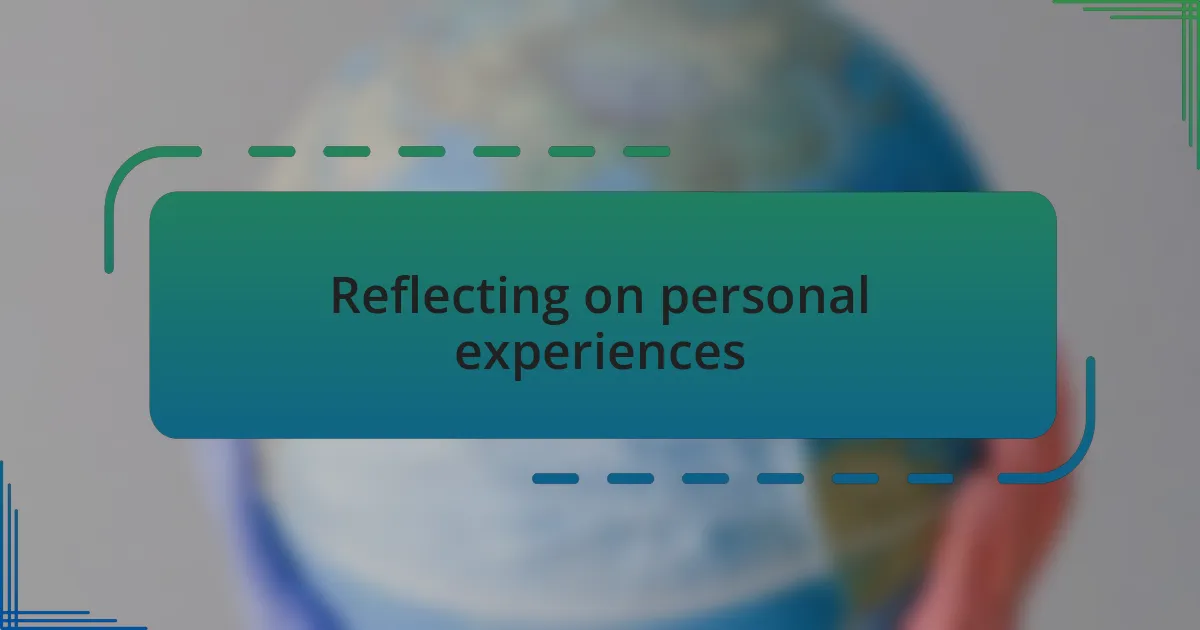
Reflecting on personal experiences
While hosting workshops, I often find myself reflecting on the various moments that resonate deeply with me. For example, there was a time when a participant shared their personal story of transforming a barren backyard into a flourishing garden. Hearing the pride and joy in their voice made me realize how powerful personal experiences can be in inspiring others. It’s these genuine moments that stick with me and reaffirm my belief in the ripple effect of sharing knowledge and stories.
I’ve also noticed how the emotional connections fostered during workshops significantly enhance the learning experience. During a particularly engaging session, a participant broke down in tears while discussing the loss of loved ones due to environmental issues. As I comforted them, I felt a wave of empathy washing over me, and I understood that climate action is not just about data or policies—it’s about people. It’s in these raw, vulnerable moments that the urgency of our mission really hits home, pushing me to reflect on my own motivations for advocating for change.
In another workshop, we brainstormed local solutions to climate change, and participants were filled with such enthusiasm and optimism. I remember one person proposing a community clean-up initiative, which sparked a lively discussion. I couldn’t help but feel inspired by their energy, reminding me that collective action is a powerful force. It makes me ponder: how often do we overlook the ability we have to inspire each other through collaboration? These reflections shape my approach to future workshops, emphasizing the need to create spaces where everyone feels empowered to contribute.
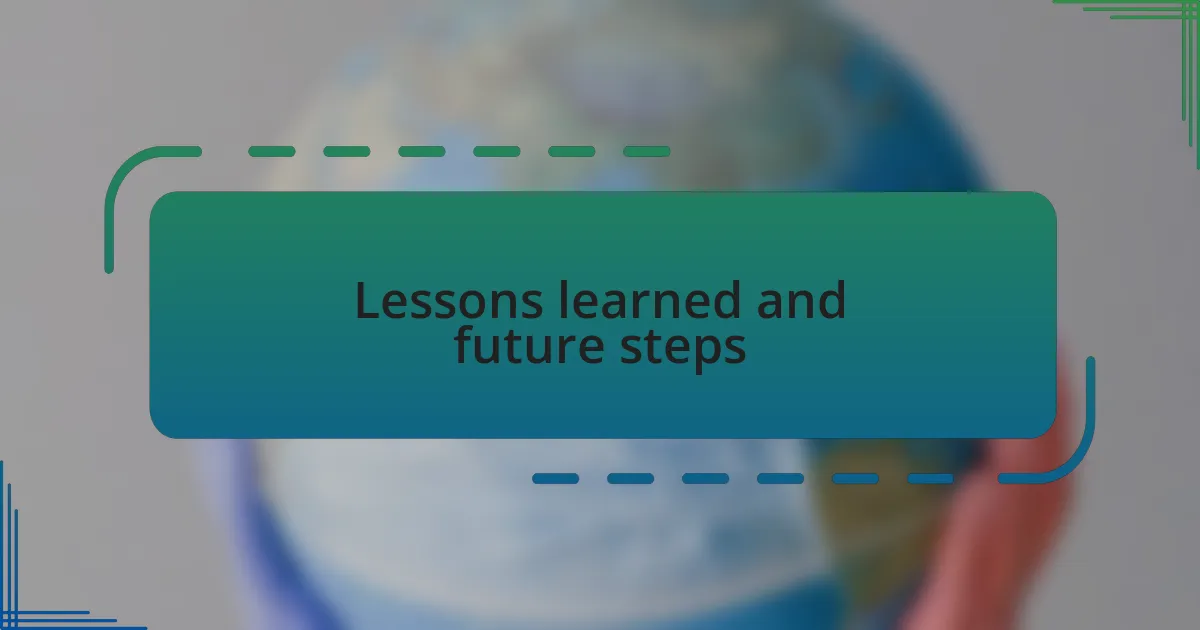
Lessons learned and future steps
When I look back at my experiences running workshops, one key lesson stands out: the importance of adaptability. There was one session where our planned activities didn’t resonate with the group. Midway, I decided to pivot and open the floor for an open discussion instead, which surprisingly turned into a powerful exchange of ideas. This taught me that being flexible and responsive to the audience can lead to unexpected insights and foster deeper connections.
I’ve also learned that the narratives we share significantly shape our collective understanding. During a workshop, we analyzed a case study of a community successfully implementing renewable energy. The excitement in the room was palpable as participants saw real-world applications of what they were learning. This experience reinforced my belief that sharing relatable success stories is essential; it elevates hope and encourages others to envision tangible change. How can we harness these stories more effectively moving forward?
As I consider future workshops, I’m committed to incorporating more interactive elements—like group brainstorming and role-playing scenarios. While leading a simulation activity in one session, the participants were deeply engaged, bringing their ideas to life. This interaction not only spurred creativity but allowed everyone to see their potential impact. I feel that empowering participants to step into these roles will help cultivate a sense of ownership over climate action. What more could we achieve if we let engagement and hands-on learning lead our discussions?